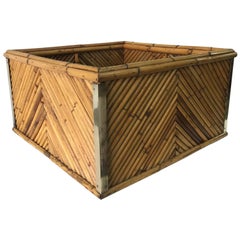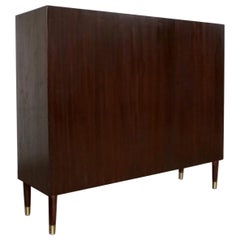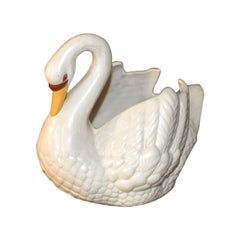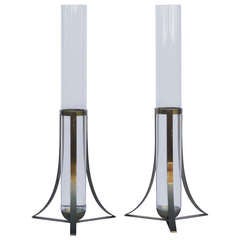Gabriella Crespi Building and Garden Elements
Bronze discs that open up like clamshells for storage and fold back in to become side tables. Sleek cubes barely suspended off the ground that transform into full-size dining tables. Clean-lined boxes that contain multilevel shelving. Looking at the work of Italian designer Gabriella Crespi, born in 1922 and who still produced furniture in her Milan studio until her death in 2017, it’s hard to believe that many of these highly functional pieces — modernist Rubik’s Cubes of materials, colors and ergonomics — were created decades ago.
Among her best-known creations, the bronze Ellisse table, 1976, and her bronze-and-lacquer Yang-Yin bar, 1979, encapsulate a designer who had a strong dualism in her vision, mixing humble and precious materials, for instance, or creating geometric shapes that were softened by sensual surfaces.
Crespi began studying architecture in 1944 at the Politecnico, in Milan, where she was among just a handful of women, and became profoundly influenced by the work of Charles-Édouard "Le Corbusier" Jeanneret and Frank Lloyd Wright. After getting married and having children, she launched her own collections, from jewelry to furniture, and soon gained a loyal following, with design houses such as Maison Dior snapping pieces up for their own lines.
She began work on her most iconic collection, Plurimi, in the late 1960s, and the series — including her Dama table, which plays on the themes of volume, light and adaptability that Crespi has explored throughout her career — flourished through the 1970s and early ’80s. Then there is her famed Z desk, from a mid-1970s series, which manages to be both stylish and humorous, looking like it’s ready to leap off the floor at any moment. Well-born and beautiful, Crespi garnered attention among the jet set. She was a muse to Valentino, and her pieces appeared in the homes of Princess Grace of Monaco, the Shah of Iran and Greek shipping magnate George Livanos.
In 1987, with her children now adults, the designer surprised everyone when she moved to the foot of the Indian Himalayas to study with the guru Sri Muniraj. This turned into a 20-year self-imposed exile that, if anything, made her pieces even more sought-after by collectors.
Find vintage Gabriella Crespi furniture on 1stDibs.
1970s Italian Vintage Gabriella Crespi Building and Garden Elements
Brass
1950s American Mid-Century Modern Vintage Gabriella Crespi Building and Garden Elements
Brass
1960s American Mid-Century Modern Vintage Gabriella Crespi Building and Garden Elements
Ceramic, Paint
20th Century American Gabriella Crespi Building and Garden Elements
Wrought Iron
Late 20th Century American Mid-Century Modern Gabriella Crespi Building and Garden Elements
Pottery
20th Century Swedish Neoclassical Gabriella Crespi Building and Garden Elements
Iron
1960s Danish Scandinavian Modern Vintage Gabriella Crespi Building and Garden Elements
Rosewood
1960s Swiss Vintage Gabriella Crespi Building and Garden Elements
Concrete
1920s Egyptian Revival Vintage Gabriella Crespi Building and Garden Elements
Bronze
21st Century and Contemporary American Organic Modern Gabriella Crespi Building and Garden Elements
Concrete
21st Century and Contemporary American Gabriella Crespi Building and Garden Elements
Steel
1960s Swiss Mid-Century Modern Vintage Gabriella Crespi Building and Garden Elements
Concrete
20th Century Italian Gabriella Crespi Building and Garden Elements
Metal, Brass
1970s Italian Hollywood Regency Vintage Gabriella Crespi Building and Garden Elements
Bronze
1960s Italian Mid-Century Modern Vintage Gabriella Crespi Building and Garden Elements
Brass
1950s Italian Vintage Gabriella Crespi Building and Garden Elements
Brass




